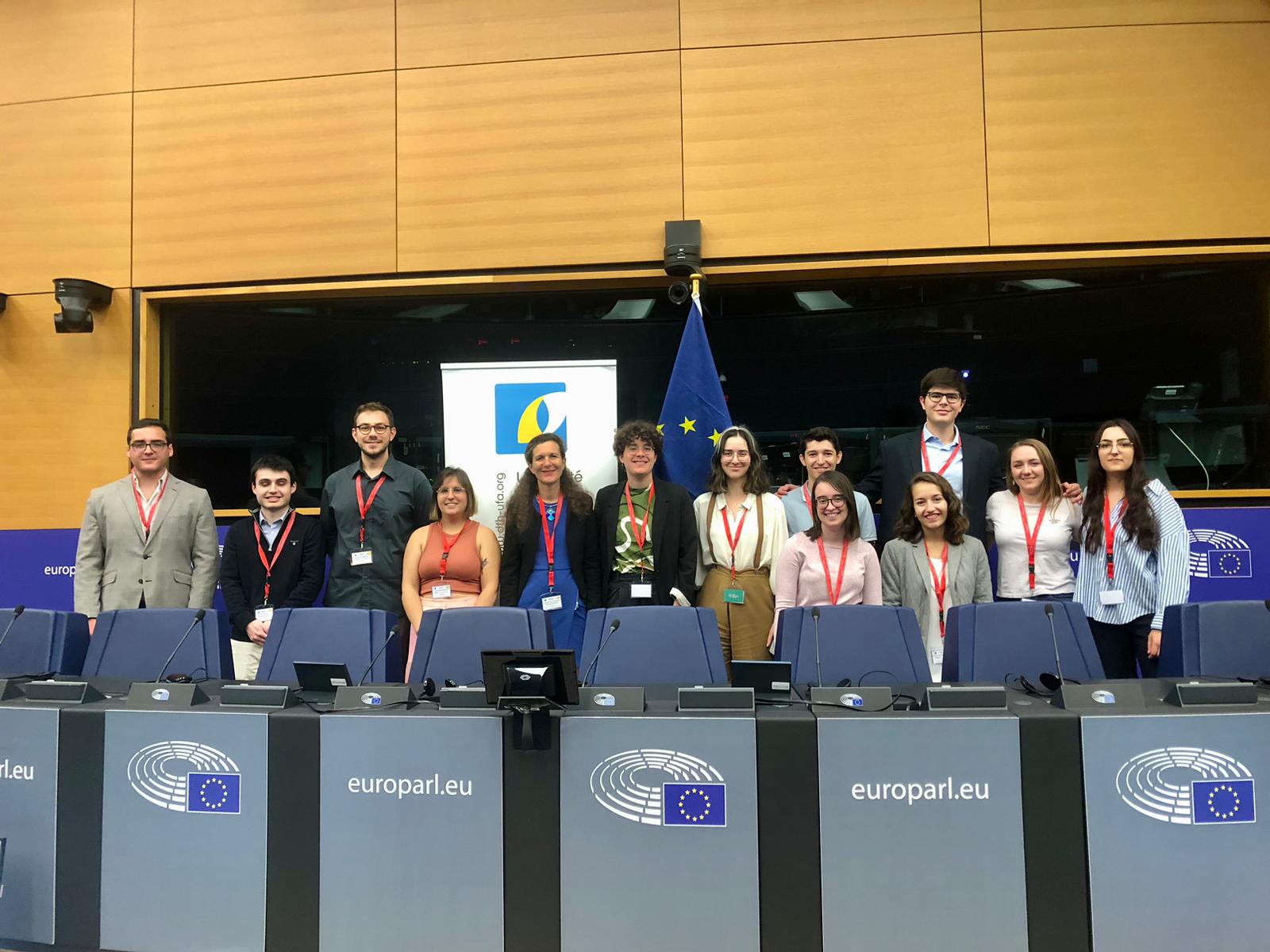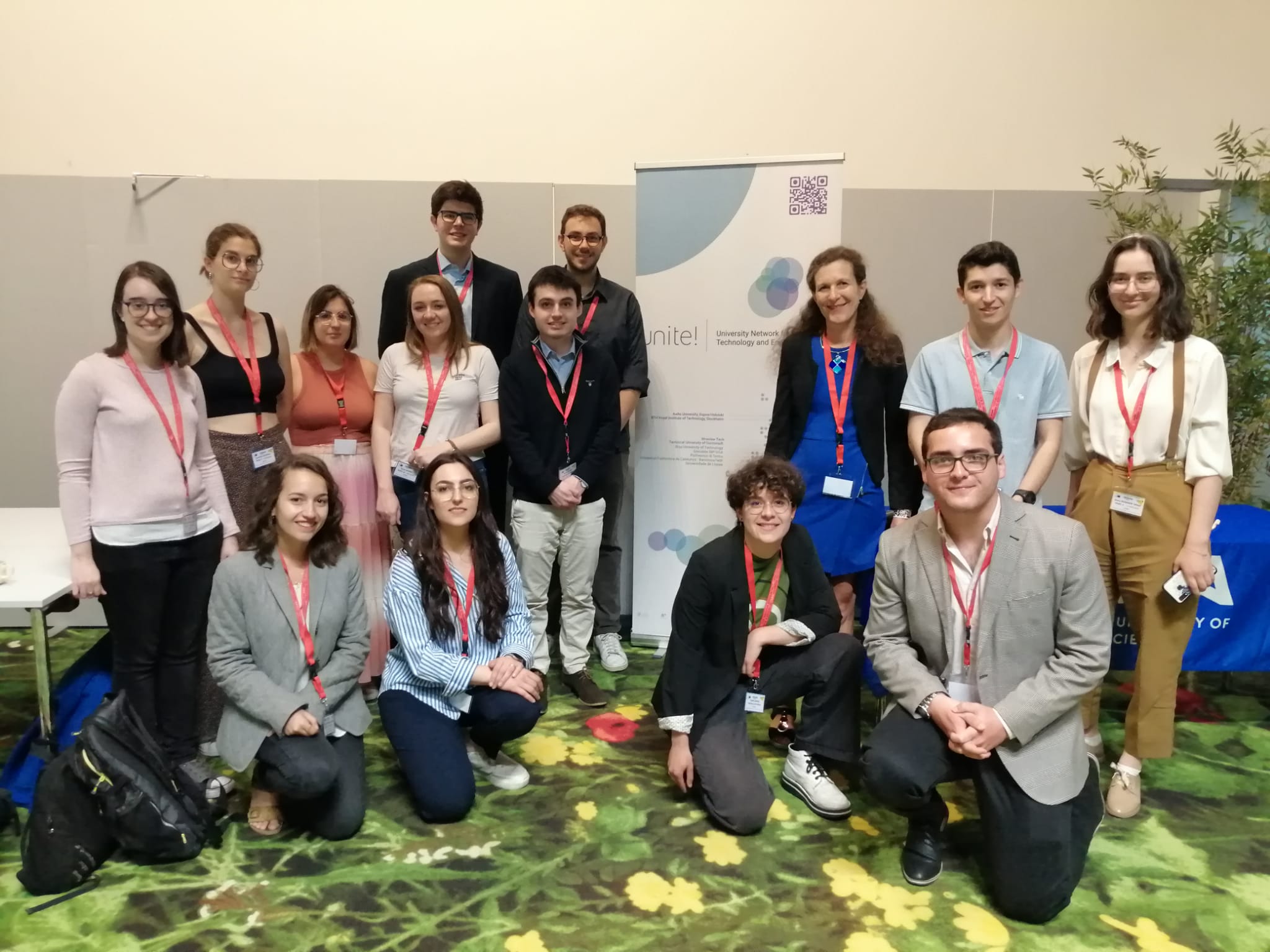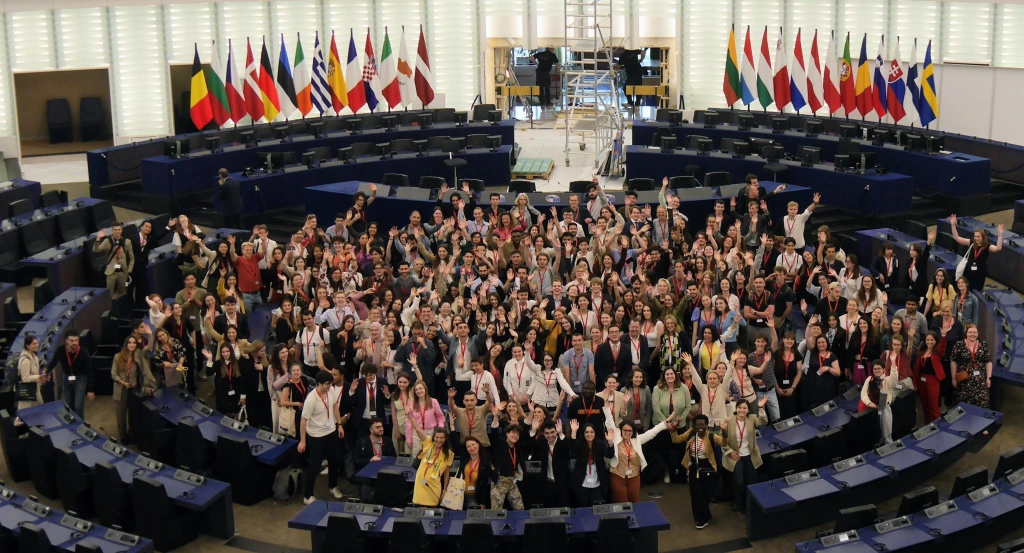7 June 2023
Unite! students contribute to the formulation of 75 recommendations for Europe at the European Student Assembly 2023
The 2nd edition of the European Student Assembly, held from 31 May to 2 June, brought together 230 students, from 40 European University Alliances and 30 countries across Europe. They gathered in the prestigious setting of the European Parliament in Strasbourg to exchange ideas, discuss pressing matters, and collaborate on shaping the future of Europe. Unite! was represented by 12 students who participated in the Assembly's various round tables, workshops and interactive sessions.
The students, invited by the European University Community (EUC), had the opportunity to delve into areas such as sustainable development, inclusion, and digital innovation, among others. Students were able to consult experts in various fields before participating in discussions and workshops. They then drafted and voted on a total of 75 policy recommendations aimed at addressing the challenges and opportunities facing Europe. The results of the Assembly, including the policy recommendations, will soon be disseminated to stakeholders, policymakers in the European Parliament, and educational institutions. Unite! students have been actively involved in the Assembly by organizing and coordinating the different panels.
Recommendations in the area of agriculture include banning food retailers from destroying and bouncing non-poisonous food products, strengthening the protection of biodiversity and marine protected areas, and funding and advising small farmers for an agro-ecological transition plan.
On the other hand, in the field of mental health, European academics propose, among other things, to ensure mental health education in schools in the European Union (EU), to create solutions for disabled young people in society and holistic, person-centred mental health care services in all European countries.
In the area of digitalisation, the young people recommend improving the interoperability of the EU's digital public administration to reduce inefficiency or subsidising research projects focused on building sustainable and responsible artificial intelligence (AI) or the establishment of an EU supervisory authority to issue guidelines on the development of AI programmes.
In the area of defence, it is recommended to foster the collaboration of all intelligence services in each member state, strengthen data protection and transparency, and increase social and institutional resilience in response to hybrid warfare threats, as well as coordinate cybersecurity and homeland security efforts. The students also discussed proposals for the cities of the future. Their proposals revolve around cities that increase the availability of free indoor public spaces, renovate existing buildings to make them energy efficient, sustainable and accessible, and introduce comprehensive measures to ensure free and accessible drinking water for all. Cities easily accessible to each other with an efficient, affordable and fully harmonised rail network.
The recommendations
Among the 75 recommendations approved at the Assembly and which will be submitted to European decision-makers, some stand out, such as organising an Annual Assembly of European Citizens or promoting "European citizenship" among the younger generations through education. The creation of a centralised and accessible European Youth Office is also proposed. In the field of education, participants recommended the organisation of European summer camps for young people or the dissemination of a European textbook among secondary school pupils.
In the field of energy, they propose improving the accuracy of energy efficiency certificates, setting European targets for eliminating fossil fuel subsidies by 92% or imposing the mandatory adoption of low-energy district heating from waste heat residues.
In the field of energy, they propose improving the accuracy of energy efficiency certificates, setting European targets for eliminating fossil fuel subsidies by 92% or imposing the mandatory adoption of low-energy district heating from waste heat residues.
Recommendations in the area of agriculture include banning food retailers from destroying and bouncing non-poisonous food products, strengthening the protection of biodiversity and marine protected areas, and funding and advising small farmers for an agro-ecological transition plan.
On the other hand, in the field of mental health, European academics propose, among other things, to ensure mental health education in schools in the European Union (EU), to create solutions for disabled young people in society and holistic, person-centred mental health care services in all European countries.
In the area of digitalisation, the young people recommend improving the interoperability of the EU's digital public administration to reduce inefficiency or subsidising research projects focused on building sustainable and responsible artificial intelligence (AI) or the establishment of an EU supervisory authority to issue guidelines on the development of AI programmes.
In the area of defence, it is recommended to foster the collaboration of all intelligence services in each member state, strengthen data protection and transparency, and increase social and institutional resilience in response to hybrid warfare threats, as well as coordinate cybersecurity and homeland security efforts. The students also discussed proposals for the cities of the future. Their proposals revolve around cities that increase the availability of free indoor public spaces, renovate existing buildings to make them energy efficient, sustainable and accessible, and introduce comprehensive measures to ensure free and accessible drinking water for all. Cities easily accessible to each other with an efficient, affordable and fully harmonised rail network.
In the field of higher education, students propose making higher education institutions visible agents of sustainable social initiatives by including civil society in academic programmes. They propose adopting transdisciplinary education to train more creative and versatile students to face the challenges of the future or extending Erasmus Mundus to degree level to strengthen European universities in their global competitiveness. They have also proposed the requirement that at least one first or second cycle student should participate in EU-funded R&D projects, as well as grants to help students from low socio-economic backgrounds or to implement AI in educational processes and compulsory internships for students.
Constance Chevallier-Govers – Associate Law professor at UGA & in charge of internationalisation
“The big difference between this year's event and last year's is that we were welcomed in the European Parliament and met in the Robert Schuman room (capacity of 300 people). The panels worked in the parliamentary committee rooms. All this made the event even more solemn than last year. We were also able to put all the recommendations to the vote one by one, thanks to the European Parliament's voting machine. Out of the 82 recommendations, 3 were not adopted. This year we also invited the alliances to attend the debates. 18 alliances came and 9 of them gave a presentation on student involvement. This exchange allowed everyone to get to know each other, and we were able to think about ways of improving the system in the coming years.”
Dana Reignier-Tayar –UGA student & Panel 2 coordinator
“This first experience at ESA has been very rewarding for me! The project gave me the opportunity to meet dozens of students from all over Europe. Our discussions made me realise the diversity of the profiles present at the assembly and what united us all: the desire to commit ourselves to the Europe in which we are going to live and work. I also really appreciated the exceptional setting offered by the European Parliament. I am very grateful for this unique opportunity and am determined to share this experience to inspire other students to follow this path.
As coordinator of Panel 2, I had the opportunity to lead the discussions within my group. It wasn't always easy to get everyone to agree on the recommendations, particularly given the limited number of proposals we could submit, but we did manage to come up with 7 recommendations that represent the fruit of more than 3 months' work and of which we are proud!”
Elisa Hausherr – UGA student & EUC intern (ESA organiser)
“It was encouraging to see our generation determined to make a positive difference. I am convinced that ESA will have a lasting impact and will play a key role in promoting exchange and collaboration between European students. This event showed the enormous potential of young people to influence change and build a better future for Europe.”



